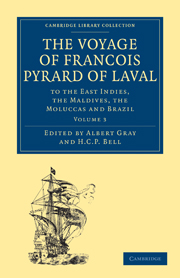Book contents
- Frontmatter
- Contents
- ADDENDA ET CORRIGENDA
- HEADINGS OF CHAPTERS
- VOYAGE: PART THE SECOND (continued)
- TREATISE OF ANIMALS, TREES, AND FRUITS
- CHAPTER I
- CHAPTER II
- CHAPTER III
- CHAPTER IV
- CHAPTER V
- CHAPTER VI
- CHAPTER VII
- CHAPTER VIII
- CHAPTER IX
- CHAPTER X
- CHAPTER XI
- CHAPTER XII
- ADVICE FOR THE VOYAGE TO THE EAST INDIES
- DICTIONARY OF SOME WORDS OF THE MALDIVE LANGUAGE
- APPENDIX
- GENERAL INDEX
- Plate section
CHAPTER XII
Published online by Cambridge University Press: 04 April 2011
- Frontmatter
- Contents
- ADDENDA ET CORRIGENDA
- HEADINGS OF CHAPTERS
- VOYAGE: PART THE SECOND (continued)
- TREATISE OF ANIMALS, TREES, AND FRUITS
- CHAPTER I
- CHAPTER II
- CHAPTER III
- CHAPTER IV
- CHAPTER V
- CHAPTER VI
- CHAPTER VII
- CHAPTER VIII
- CHAPTER IX
- CHAPTER X
- CHAPTER XI
- CHAPTER XII
- ADVICE FOR THE VOYAGE TO THE EAST INDIES
- DICTIONARY OF SOME WORDS OF THE MALDIVE LANGUAGE
- APPENDIX
- GENERAL INDEX
- Plate section
Summary
In all the Indies there is no tree which serves so many purposes of the nourishment and convenience of man as the tree which produces the cocos or Indian nut.
The Portuguese call this tree Palmero and the fruit Cocos. The Maldivians call it Roul and the fruit Caré. The Malabars call it Tengua, and the Guzerats Narquilly. It grows only in countries that are within the two Tropics, because it requires nothing but a warm and humid soil; and yet it is not found throughout the whole Torrid Zone, but only in certain places, where it is a marvel to see it growing all naturally and without cultivation; and one of its chief places is the Maldives, where it is more abundant than in all the rest of the world together. Such, indeed, is its increase there that the natives have to cut it down to make room for their houses and buildings. Usually, they do not allow these trees to stand too close to their houses, both because the trees are frequently blown down by the wind, thereby ruining the houses and killing the occupants, and because great quantities of nuts are falling every day owing to the rats, and they often cause the death of men by reason both of the height of the tree and the weight of the fruit.
- Type
- Chapter
- Information
- The Voyage of François Pyrard of Laval to the East Indies, the Maldives, the Moluccas and Brazil , pp. 372 - 386Publisher: Cambridge University PressPrint publication year: 2010First published in: 1890

